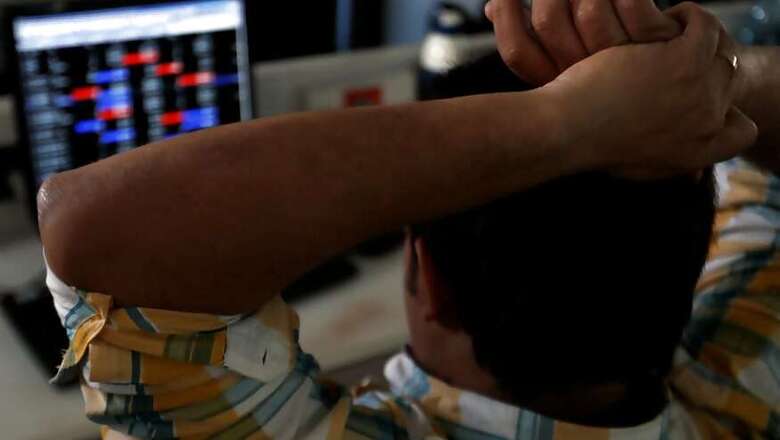
views
The deadly novel coronavirus (COVID-19) is not only taking a toll on humans, it has also been roiling equity markets around the globe. India is no exception to this mayhem.
Nearly Rs 10 lakh crore of market cap was wiped out as the Nifty and Sensex crashed on Thursday morning in the biggest single-day decline ever. Indian stock markets have now officially entered the ‘bear’ territory as Nifty 50 slipped below the 9,700 mark for the first time since September 2017 and the Sensex crashed by nearly 2,500 points, the lowest in almost two years.
Market watchers say COVID-19 worries mounted as the World Health Organisation (WHO) has now termed it a global pandemic. Also, the markets opened with the news that the United States has banned all travel from Europe (barring the UK) for a month and the panic among investors seemed real.
The Indian economy has anyway been in a tailspin for months now, with factory output shrinking, the financial sector in a free fall, exports down and private investments plummeting. The COVID-19 threat is likely to shave off some more points from an already tepid GDP growth forecast for India for the current and next fiscal years.
Anyhow, the events leading up to Thursday morning’s market crash will likely worsen the situation for Indian investors.
The Other Contagion - Yes Bank
Take the sudden supersession of the board of India’s fourth private bank, Yes Bank, last Thursday by the RBI. This was done to ostensibly prevent a run on the bank and stopping the contagion from spreading further in the domestic financial markets. But by asking the State Bank of India (SBI) to pump in money to keep Yes Bank afloat, the government has not only socialized private losses, it has also hurt the confidence of investors and of the non-banking financial industry (NBFI) as a whole.
India's NBFI will now likely face renewed pressure on funding and liquidity following the Reserve Bank of India's (RBI) takeover of Yes Bank this month, says Fitch Ratings.
The consequences will compound the credit squeeze across the country's financial system, adding to current economic uncertainty.
Global ratings agency Fitch has pointed out that while the exposure of a large part of India’s non-banking financial institutions was negligible to this bank “nonetheless, the recent announcement may bring about broader contagion effects for NBFI funding conditions. The RBI's planned reconstruction scheme broadly protects the deposits and liabilities of the bank, but calls for a write-down on its Basel III AT1 instruments at present. This may trigger another round of investor risk aversion that tightens market access and raises overall funding costs for borrowers, with wholesale NBFIs likely to remain more vulnerable in this situation.”
Put simply, the near collapse of Yes Bank and now the turnaround package being implemented by the government will raise funding costs for all borrowers.
Fitch has further said that there may also be knock-on effects for NBFIs if smaller private banks start to face deteriorating depositor confidence. Banks have been an important source of liquidity for NBFIs amid the funding squeeze in the local debt markets over the past 18 months, and any weakness in bank deposit funding would constrict liquidity available for lending to the NBFI sector.
Already, there have been news reports of at least two smaller but healthy private banks nearing collapse (these reports have been successfully contested) and analysts concur that regardless of what the government and the RBI do to instill investor confidence, depositors of private banks have lost confidence in the system.
Private Capex Elusive
India’s famed private sector has pulled back expenditure as more of factory capacity remains idle across industries and exports shrink. A Bank of Baroda analysis found that capital expenditure by the private sector nosedived 40% in the December quarter of 2019-20 against the same quarter of the previous fiscal to Rs 1.3 lakh crore. If one were to consider the nine-month period from April to December 2019-20, then the expenditure was down to almost half.
The BoB analysts have said that despite the government slashing corporate tax rates by a large margin earlier in the fiscal year, this tax cut has had little effect on capex as only a handful of companies are looking to reinvest the savings amid a dull economic climate. In other words, with economic growth tapering, companies are not expanding manufacturing capacities since the ones already installed are not functioning anywhere near peak capacity.
Crude Price Crash Could Help
The Brent crude prices have been in a freefall these last few days and some analysts believe that can only be a good thing for the beleaguered Indian economy. As they speculate over the increasing possibility of prices stabilising at 40-45 US dollars per barrel, estimates suggest a windfall for India which is hugely dependent on imports to fulfill its domestic oil needs. This windfall could help improve the precarious fiscal situation in India.
But the Indian economy is now further from recovery than it was before the COVID-19 pandemic and despite the relief seen through lower oil prices, economic recovery is likely to be delayed. The markets have entered the bear phase and market watchers are advising investors to remain in invested in mutual funds and do cherry picking of select sectors to safeguard their monies.




















Comments
0 comment